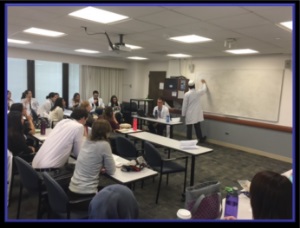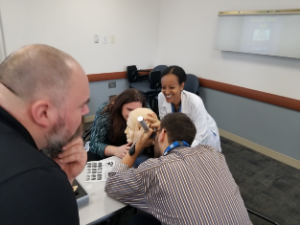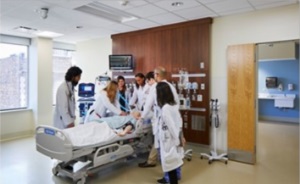Conferences
Conferences

Educational sessions take place in an in person format and are in accordance with hospital room occupancy policies. We provide a virtual option for residents on outside rotations and electives.
Educational conferences: Tuesday, Thursday, and Friday from 12PM-1PM
The educational conference series includes a variety of longitudinal topics. During this time, we focus on case conferences as well as wellness, advocacy, diversity, equity, and inclusion, quality improvement and global health. This series also includes lectures on bioethics, research, evidence based medicine, and career development. Our case conferences are led by the senior residents. It is a weekly opportunity for the residents to discuss complex cases, differential diagnoses, and clinical pearls related to the case, and serve as an important opportunity for senior residents to claim the teaching role.
Pediatric grand rounds: Wednesday from 12-1PM
Pediatric Grand Rounds provides cutting edge information on a wide variety of pediatric topics and is directed toward faculty, residents, community pediatricians, and hospital staff. In addition to our extensive pediatric subspecialty and surgical faculty, presenters include both local and national speakers. Once monthly multidisciplinary case conference is an interactive panel discussion amongst residents and faculty where a particularly challenging case of patient morbidity or mortality is reviewed. This lecture series is presented via Microsoft Teams.
Academic Half Day (AHDs)
All residents in the program are divided into learning cohorts of 15-16 residents, determined by their "Y" week in the X+Y schedule. Cohorts are composed of PGY1, PGY2 and PGY3 residents who learn together throughout the academic year in two small group academic half days.
Outpatient AHD, Thursday from 1-4PM
- Outpatient general pediatrics centered academic half day occurs once monthly for each cohort of residents during their ambulatory clinic week. This small group session includes one resident cohort and an outpatient general academic pediatrics faculty member. These sessions review high-yield topics related to clinical practice to help ensure that all residents develop a solid outpatient pediatric knowledge base. During each session, residents have the opportunity for case-based learning, developing their teaching skills, and participating in team-based learning. The curriculum is designed to be repeated every 18 months in order to reinforce concepts over the course of residency.
Subspecialty AHD, Tuesday from 8:30-11:30AM
- Subspecialty-based academic half day occurs once monthly for each cohort of residents during their ambulatory clinic week. As with the outpatient academic half day, this session includes a resident cohort, and an array of subspecialists throughout the academic year. The curriculum is derived from the American Board of Pediatrics specifications. Educational sessions are presented by pediatric faculty and topics are repeated twice over the three years of residency training. The goal for these sessions is to review pediatric board specific content with different modalities including presentations, team-based learning and board review questions. In addition to board specific content, subspecialty academic half day also includes our residents-as-teachers curriculum, and a procedures workshop. These provide a comprehensive education on the many aspects that make up a life practicing pediatric medicine.
Chief Case Conference: Friday 12-1PM
Chief Case Conference is an interactive conference that embraces the concepts of adult learning theory. The Chief Residents present a clinical case in ‘morning-report’ style which is meant to be interactive and engaging as the residents learn how to think through a clinical case and build a differential.
Board review course: New this upcoming academic year we provide a week-long board review course for all PGY-3s!
Each spring we integrate a structured board review course into our didactic curriculum. In a classic board review “hot topic” format, we incorporate lecturers from both Advocate Children’s Hospital-Park Ridge and at Advocate Children’s Hospital-Oak Lawn via telepresence to provide comprehensive preparation for the pediatric board exam. The board review week will be protected time for all PGY-3s in order to fully immerse themselves into a classroom style learning environment. During this time the rising PGY-3s (current PGY-2s) will be covering all senior-led roles on the inpatient floor. This provides a good learning opportunity for the PGY-2s as they navigate the senior role as well as provides the PGY-3s a full week of no clinical responsibility.
Mock in-training exam (ITE)
Biannually we administer a 40 question Mock ITE that is prepared by chief residents using past PREP questions. Questions are graded and answer explanations provided to the residents. This is an important way that residents can trend progress of their board prep throughout their 3 years and supplements the annual In Training Exam from the American Board of Pediatrics.
Journal club/evidence-based medicine workshops
Journal Club occurs throughout the academic year and consists of two PGY2s reviewing a peer reviewed journal articles of their choice. A Critically Appraised Topic format is employed to analyze the validity and applicability of the research to the case. Each resident class answers a series of questions which are subsequently reviewed as a group. The goal of the session is to learn the skills necessary to be productive consumers of clinical research. Additionally, multiple board-relevant statistics topics are reviewed over the course of the year within these sessions. Several faculty members as well as the director of pediatric research are present to discuss and critique the analysis of the article.

Procedural skills workshops
Interactive workshops on a variety of procedural skills are held throughout the year. These include peripheral IV's, intubations, central line placement, otology, suturing, catheterizations, lumbar punctures and splinting. Faculty demonstrate the techniques on models and residents are provided the time to develop the manual dexterity and knowledge necessary to perform these procedures.
Residents are encouraged to practice procedures in real time prior to performing them on patients. Trainer devices are available for lumbar puncture, venipuncture, intubation, central line insertion, chest tube insertion, and bladder catheterization.

Simulation lab
Residents practice their resuscitation skills in the state-of-the-art simulation center. Advocate Children’s Hospital in Park Ridge is proud to be the home Advocate’s largest Simulation Center. Simulations are held quarterly, and residents and nursing staff are assigned to participate in these sessions supervised by our Chief Resident and the ACH Director of Simulation. Each resident participates in at least 3 group simulations a year, along with 1 NICU simulation a year, a communication simulation, and a smaller individualized simulation in the PGY1 year. These sessions are followed by a debriefing during which participants give and receive feedback on both the medical and teamwork components of resuscitation.
